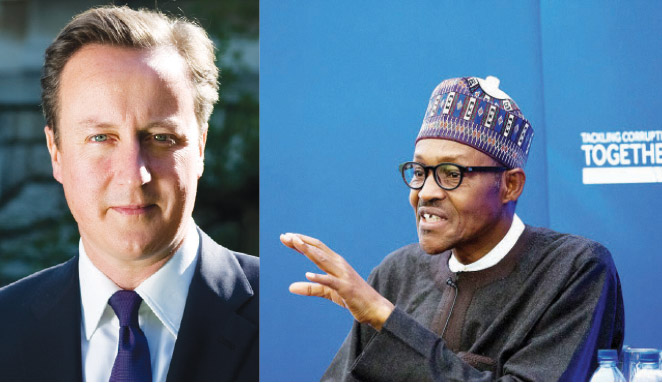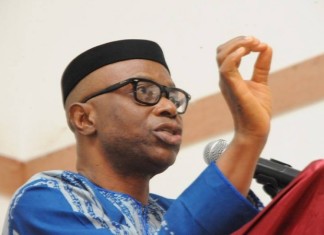During the week, world leaders gathered in London, for an epic summit focusing on corruption. Despite upbraids and name-callings, Nigeria demanded the repatriation of its stolen assets from Britain. SAM NWOKORO presents excerpts of what transpired at the summit.
Leaders of about 60 countries from various continents gathered on Thursday, May 12, in Lancaster, London, for first worldwide anti-corruption summit to brainstorm on how to tackle the problem of corruption in the world today. The summit, with the theme ‘Exposing Corruption, Tackling Corruption and Driving Out Corruption’ was at the behest of British Prime Minister, David Cameron.
But two major tax havens – Panama and British Virgin Islands (BVI) – were not invited to the inaugural global meeting. They were closely linked to the Panama Papers scandal, where 11 million documents leaked from law firm, Mossack Fonseca, revealed the names and company details of those with offshore investments situated in so-called tax havens.
The Panama government told The Times that it would not be attending the summit at Lancaster House in London, because it had not received an invitation. The British Virgin Islands also said that it had not been invited.
President Muhammadu Buhari, who the summit mattered so much to, was there.
Buhari played a prominent part in the summit, including delivering a keynote address entitled ‘Why We Must Tackle Corruption Together’ at a pre-summit conference of development partners, the Commonwealth Enterprise and Investment Council, Transparency International and other civil society groups on Wednesday, May 11.
Buhari also spoke at the opening session of the summit with Cameron and the President of the World Bank, Jim Yong Kim.
Buhari’s delegation to the summit included the Minister of Justice and Attorney-General of the Federation, Abubakar Malami, and the acting Chairman of the Economic and Financial Crimes Commission (EFCC), Ibrahim Magu.
Nigeria ‘fantastically corrupt’
As Buhari was still airborne to the United Kingdom, Cameron was caught on camera describing Nigeria and Afghanistan as “fantastically corrupt countries”. He was talking with the queen about the summit in a meeting, the video of which was obtained by Reuters, was on the eve of the summit.
Cameron was heard singling out the two countries as “possibly the two most corrupt countries in the world”, in footage on ITV News showing him chatting in a group including the Archbishop of Canterbury, Justin Welby; and House of Commons Speaker, John Bercow; UK Independent reports.
“We had a very successful cabinet meeting this morning, talking about our anti-corruption summit,” Cameron said when the Queen approached. “We have got the Nigerians – actually we have got some leaders of some fantastically corrupt countries coming to Britain.”
The Queen, however, did not respond to Cameron’s comment, even as Welby intervened that “this particular President is actually not corrupt.”
Nigeria is reportedly at number 136 in Transparency International (TI)’s latest Corruption Perception Index (CPI), while Afghanistan is ranked 166, making it the second from bottom.
But the Presidency was not amused by the comment, as it described the statement credited to Cameron as “embarrassing”.
Senior Special Assistant to the President on Media, Garba Shehu, shortly after the news of the PM’s comment went viral on the Internet, said the remark was wrongly timed and in bad faith.
Surprisingly, Buhari agreed with the British PM. When asked by Sky News’ Diplomatic Editor, Dominic Waghorn, whether Nigeria was fantastically corrupt, he said: “Yes”.
He maintained that uppermost in his mind was the return of assets and funds stacked away in Britain and other countries to Nigeria.
“I am not going to demand an apology from anybody. All I will demand is the return of assets.
“I have already mentioned how Britain really led and how disgraceful one of the Nigerian executives was; he had to dress like a woman to leave Britain and leave behind his bank account and fixed assets, which Britain is prepared to hand over to us.
“This is what I am asking for. What will I do with apology; I need something tangible,” he said.
Buhari’s new anti-graft strategy
In London on Thursday, Buhari disclosed that he had been re-invigorated to ensure corruption in Nigeria is curtailed, saying Nigeria would soon begin the full implementation of the principles of the ‘open contracting data standard’.
In Nigeria’s statement to the anti-corruption summit, Mr. President was quoted by his media aide, Femi Adesina, as saying that the Nigerian government would apply the standard to major projects in the oil, transportation, power, health, education and other sectors.
The open contracting data standard enables disclosure of data and documents at all stages of the contracting process by defining a common data model.
Publication of the data ensures greater transparency in public contracting, and can support accessible and in-depth analysis of the efficiency, effectiveness, fairness and integrity of public contracting systems, Adesina said.
Buhari said his administration was also taking steps to ensure greater transparency of the ownership and control of all companies involved in property purchase and public contracting.
He also welcomed a proposal to restrict the ability of those involved in corruption to travel, invest and do business overseas.
“We commit to joining the pilot initiative for automatic exchange of beneficial information. Nigeria commits to deploying public-private information sharing partnerships to bring together governments, law enforcement (agencies), regulators and the financial sector to detect, prevent and disrupt money laundering linked to corruption.”
U.S., Britain share blame
The summit was a time for Britain and the United States (U.S.) to look at their own policies and their role as shelters for billions of dollars stolen by corrupt politicians in developing countries. It shifted the focus on global corruption, turning the spotlight of blame away from African Generals, oligarchs and corrupt dictators and towards the rich countries, whose banks and real estate brokers have been the benefactors of the stolen wealth.
U.S. Secretary of State, John Kerry, said tens of billions of dollars in stolen money – funds that could be used for education or building bridges in underdeveloped lands – instead are hidden in banks “in countries including ours”.
“We are fighting a battle – all of us – for our states, for our countries, for our nation state. Corruption is as much of an enemy because it destroys nation states as some of the extremists we are fighting,” Kerry told delegates at the summit.
“The extremism we see in the world today comes in no small degree from the utter exasperation that people have with the sense that the system is rigged,” the top American diplomat said. “And we see this anger manifesting itself in different forms in different elections around the world – including ours.”
Change goes global
British officials said the one-day meeting that drew leaders from Afghanistan, Colombia, Nigeria and other countries aims at stepping up global action to expose, punish and drive out corruption at all levels of society.
“If we were having this anti-corruption summit 10 years ago, we would have been talking about African kleptocrats, the theft of state assets from the people,” said Alex Cobham of the Tax Justice Network, a British advocacy group. Now, he said, the world has changed.
“We’re really thinking about the providers of the financial secrecy that don’t just facilitate but actively drive corruption of different sorts all around the world,” he told the Voice of America (VOA).
In the background of the summit were the Panama Papers’ revelations about how and where the world’s powerful hide their money.
For Cameron, the revelations hit home, showing how his late father ran an offshore fund to avoid paying British taxes. The PM eventually said that he, too, had a stake in the dealings.
Reforms loom
The Panama Papers disclosures fuelled calls for reforms in Britain’s offshore possessions, after it was learned that more than half of the 210,000 companies exposed were registered in the British Virgin Islands.
Cameron announced measures, including a public register, intended to force companies to name their real owners – a measure that British government officials claim will be the first of its kind.
“Why I think this matters so much is that I believe that corruption is the cancer at the heart of so many problems we need to tackle in our world. If we want to see countries escape poverty and become wealthy, we need to tackle corruption,” the British leader said Thursday.
The Panama Papers named relatively few Americans and no high-ranking public official. But anti-corruption advocates see the U.S. as a major area of concern about tax evasion and money laundering, in states such as Delaware, Nevada and Wyoming, which have been criticised for allowing corporations to be formed inexpensively and secretively.
Kerry said a proposed law will force companies formed in the U.S. to report complete information about their owners, and a rule will require banks to keep records on the true owners of their corporate customers.
Efforts to rebuild trust
Washington and London see combating corruption as a matter of legitimacy and security, analysts say, especially in the wake a decade of financial crises that have reduced millions of people to poverty, unemployment and frustration.
Tim Evans, a professor of political economy at London’s Middlesex University, sees the summit – and, more broadly, the drive to combat corruption – as a sign of concern among the elite nations.
“They’re worried at the loss of legitimacy that will come from rich and powerful people being able to evade taxes and get away with it. So, I think there’s huge pressure on the elite to be seen to be engaging the subject and to be doing something about it.
“Given some of the things, some of the riots and problems we’ve seen in Europe and in the United States in recent years, the politicians are fearful, and they’re becoming focused on trying to rebuild trust and transparency,” he said.
Buhari praised Cameron’s decision to hold the summit. “I thank you very much for your courage for taking the opportunity to mobilise us and take this very, very topical and serious subject. Corruption is one of the greatest enemies of our time.”
• With additional report from VOA















